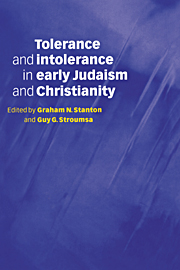Book contents
- Frontmatter
- Contents
- List of contributors
- List of abbreviations
- Introduction
- 1 Intolerance and martyrdom: from Socrates to Rabbi ‘Aqiva
- 2 The other in 1 and 2 Maccabees
- 3 The pursuit of the millennium in early Judaism
- 4 Conservative revolution? The intolerant innovations of Qumran
- 5 Who was considered an apostate in the Jewish Diaspora?
- 6 Why did Paul persecute the church?
- 7 Paul and the limits of tolerance
- 8 Philo's views on paganism
- 9 Coexisting with the enemy: Jews and pagans in the Mishnah
- 10 Tertullian on idolatry and the limits of tolerance
- 11 The threefold Christian anti-Judaism
- 12 The intertextual polemic of the Markan vineyard parable
- 13 Jews and Jewish Christians in the land of Israel at the time of the Bar Kochba war, with special reference to the Apocalypse of Peter
- 14 The Nazoreans: living at the boundary of Judaism and Christianity
- 15 Justin Martyr's Dialogue with Trypho: group boundaries, ‘proselytes’ and ‘God-fearers’
- 16 Accusations of Jewish persecution in early Christian sources, with particular reference to Justin Martyr and the Martyrdom of Polycarp
- 17 Early Christians on synagogue prayer and imprecation
- 18 Messianism, Torah and early Christian tradition
- 19 Jewish and Christian public ethics in the early Roman Empire
- Postscript: the future of intolerance
- General bibliography
- Index
11 - The threefold Christian anti-Judaism
Published online by Cambridge University Press: 08 March 2010
- Frontmatter
- Contents
- List of contributors
- List of abbreviations
- Introduction
- 1 Intolerance and martyrdom: from Socrates to Rabbi ‘Aqiva
- 2 The other in 1 and 2 Maccabees
- 3 The pursuit of the millennium in early Judaism
- 4 Conservative revolution? The intolerant innovations of Qumran
- 5 Who was considered an apostate in the Jewish Diaspora?
- 6 Why did Paul persecute the church?
- 7 Paul and the limits of tolerance
- 8 Philo's views on paganism
- 9 Coexisting with the enemy: Jews and pagans in the Mishnah
- 10 Tertullian on idolatry and the limits of tolerance
- 11 The threefold Christian anti-Judaism
- 12 The intertextual polemic of the Markan vineyard parable
- 13 Jews and Jewish Christians in the land of Israel at the time of the Bar Kochba war, with special reference to the Apocalypse of Peter
- 14 The Nazoreans: living at the boundary of Judaism and Christianity
- 15 Justin Martyr's Dialogue with Trypho: group boundaries, ‘proselytes’ and ‘God-fearers’
- 16 Accusations of Jewish persecution in early Christian sources, with particular reference to Justin Martyr and the Martyrdom of Polycarp
- 17 Early Christians on synagogue prayer and imprecation
- 18 Messianism, Torah and early Christian tradition
- 19 Jewish and Christian public ethics in the early Roman Empire
- Postscript: the future of intolerance
- General bibliography
- Index
Summary
Whereas some writers, following the example of Gibbon, would view monotheism as a system which of itself generates intolerance, others would consider intolerance to be the very measure of faith. Monotheism cannot, in fact, be the cause of division between Jews and Christians since, as Tertullian points out, both groups share the same conception of the divine even though their manner of worship differs (Apol. 21.2–3). And yet, the question which is at the heart of this book is a real one: can there or should there be limits to tolerance between the two faiths? Indeed, are there already existing limits? The question can be expressed in other ways: how can the two faiths maintain their distinctiveness and coexist? And how can self-identity be preserved when, as several contributors to this volume suggest, intolerance is an indication of a feeling of uncertainty and ‘a proof of weakness’? How can the transition be made from principle de iure to practice de facto when the distance from the law to the application of the law is so often a long way to travel? Is it a question of a majority-minority relationship? What justifications for intolerance can be offered, from both the Jewish and the Christian sides, if ‘tolerance and acceptance of one's neighbour, especially if he is a monotheist, are fundamental religious principles of the Synagogue’ or if, as Y. Leibovitz has underlined, ‘the Torah makes no provision for compelling by force’? What is to be made of the interpretations given within the Christian tradition of the well-known compelle intrare, ‘compel people to come in’ (Luke 14:23), in order to justify religious coercion?
- Type
- Chapter
- Information
- Tolerance and Intolerance in Early Judaism and Christianity , pp. 185 - 210Publisher: Cambridge University PressPrint publication year: 1998
- 1
- Cited by



